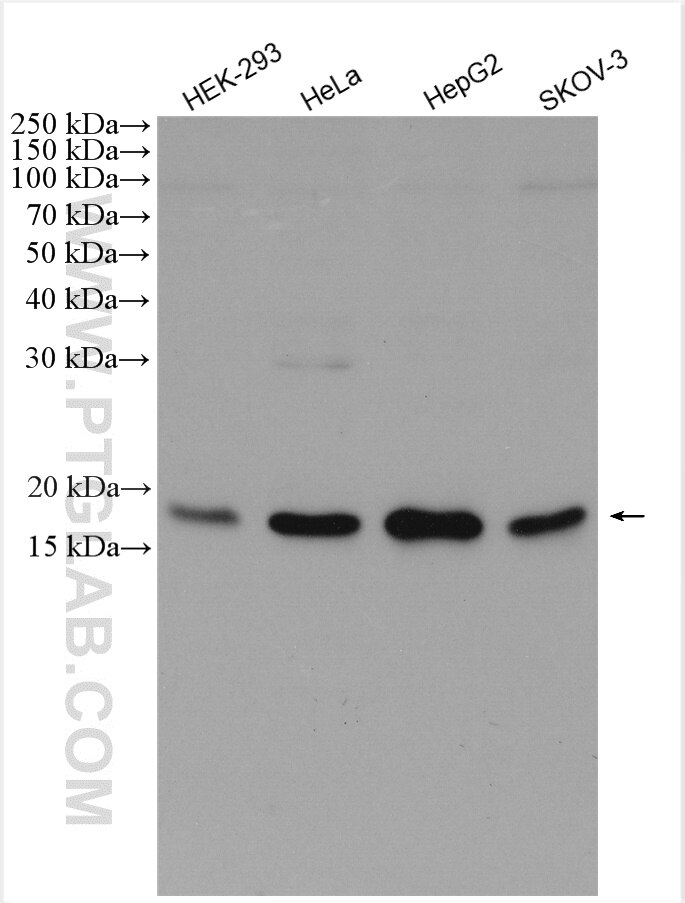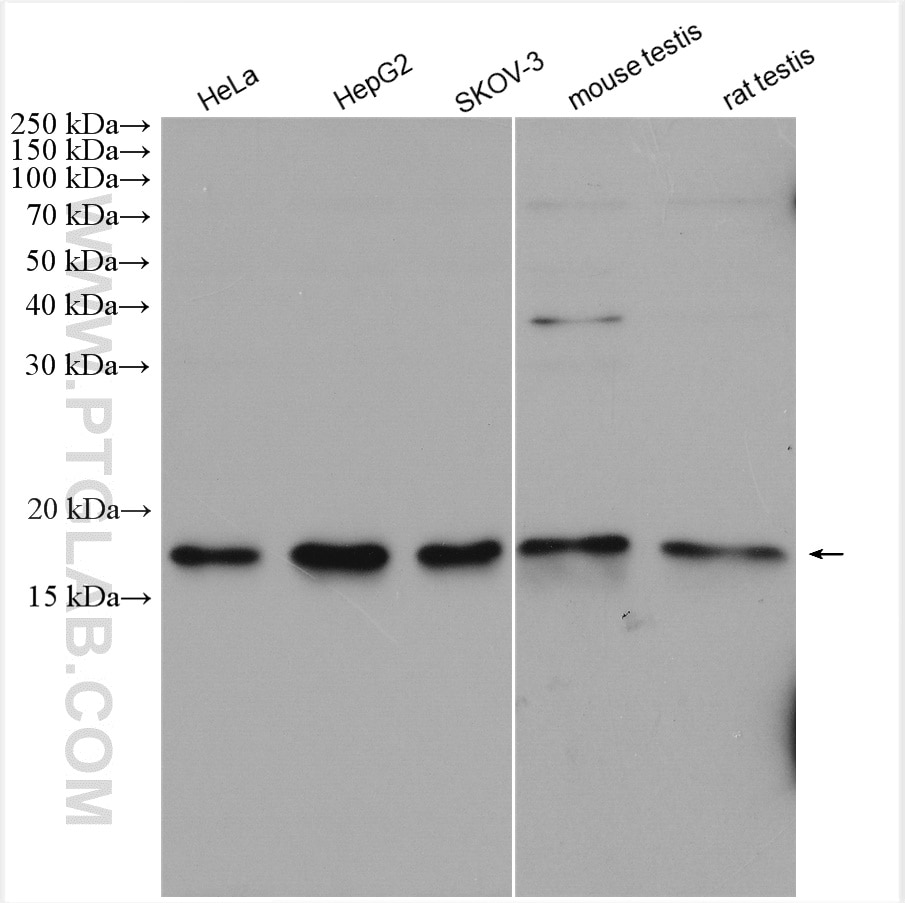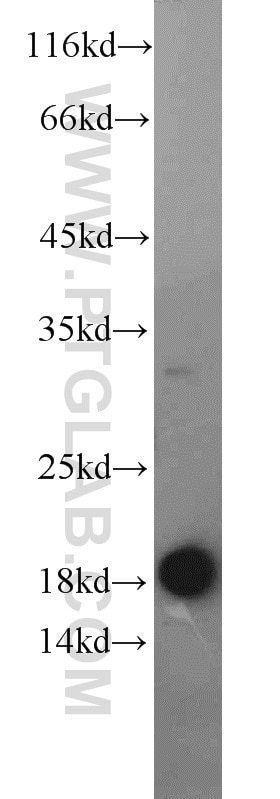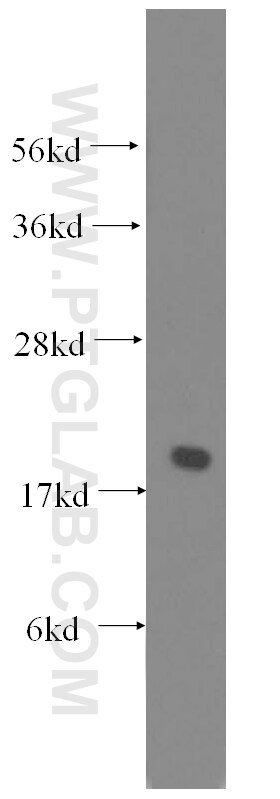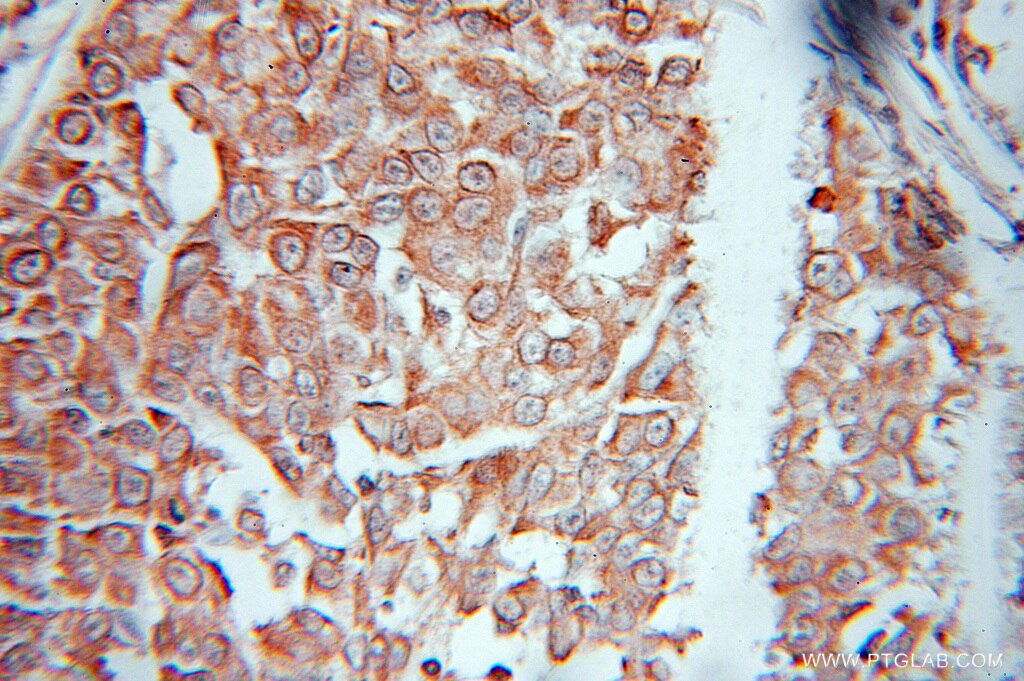- Phare
- Validé par KD/KO
Anticorps Polyclonal de lapin anti-EEF1E1
EEF1E1 Polyclonal Antibody for WB, IHC, ELISA
Hôte / Isotype
Lapin / IgG
Réactivité testée
Humain, rat, souris
Applications
WB, IHC, IF, ELISA
Conjugaison
Non conjugué
N° de cat : 10805-1-AP
Synonymes
Galerie de données de validation
Applications testées
| Résultats positifs en WB | cellules HEK-293, cellules HeLa, cellules HepG2, cellules Jurkat, cellules SKOV-3, tissu testiculaire de rat, tissu testiculaire de souris, tissu testiculaire humain |
| Résultats positifs en IHC | tissu de cancer du sein humain il est suggéré de démasquer l'antigène avec un tampon de TE buffer pH 9.0; (*) À défaut, 'le démasquage de l'antigène peut être 'effectué avec un tampon citrate pH 6,0. |
Dilution recommandée
| Application | Dilution |
|---|---|
| Western Blot (WB) | WB : 1:500-1:2000 |
| Immunohistochimie (IHC) | IHC : 1:20-1:200 |
| It is recommended that this reagent should be titrated in each testing system to obtain optimal results. | |
| Sample-dependent, check data in validation data gallery | |
Applications publiées
| KD/KO | See 1 publications below |
| WB | See 4 publications below |
| IF | See 1 publications below |
Informations sur le produit
10805-1-AP cible EEF1E1 dans les applications de WB, IHC, IF, ELISA et montre une réactivité avec des échantillons Humain, rat, souris
| Réactivité | Humain, rat, souris |
| Réactivité citée | Humain |
| Hôte / Isotype | Lapin / IgG |
| Clonalité | Polyclonal |
| Type | Anticorps |
| Immunogène | EEF1E1 Protéine recombinante Ag1092 |
| Nom complet | eukaryotic translation elongation factor 1 epsilon 1 |
| Masse moléculaire calculée | 20 kDa |
| Poids moléculaire observé | 20 kDa |
| Numéro d’acquisition GenBank | BC005291 |
| Symbole du gène | EEF1E1 |
| Identification du gène (NCBI) | 9521 |
| Conjugaison | Non conjugué |
| Forme | Liquide |
| Méthode de purification | Purification par affinité contre l'antigène |
| Tampon de stockage | PBS with 0.02% sodium azide and 50% glycerol |
| Conditions de stockage | Stocker à -20°C. Stable pendant un an après l'expédition. L'aliquotage n'est pas nécessaire pour le stockage à -20oC Les 20ul contiennent 0,1% de BSA. |
Informations générales
During the translation processes, aminoacyl-tRNA synthetases (ARSs) ligate specific amino acids to tRNAs. Together with non-enzymatic proteins called ARS-interacting multifunctional proteins (AIMPs), the ARSs form a macromolecular complex [PMID:15286174]. This complex has an essential role in protein synthesis, but also in other biological processes including angiogenesis, apoptosis, and inflammation. [PMID:21789020] AIMP3 is not only associated with the multi-tRNA synthetase complex via its specific interaction with methionyl-tRNA synthetase, but also works as a tumor suppressor by interacting with ATM, the upstream kinase of p53 [PMID:18343821].
Protocole
| Product Specific Protocols | |
|---|---|
| WB protocol for EEF1E1 antibody 10805-1-AP | Download protocol |
| IHC protocol for EEF1E1 antibody 10805-1-AP | Download protocol |
| Standard Protocols | |
|---|---|
| Click here to view our Standard Protocols |
Publications
| Species | Application | Title |
|---|---|---|
Mol Cell A methyltransferase-independent role for METTL1 in tRNA aminoacylation and oncogenic transformation | ||
J Cell Mol Med AIMP3 inhibits cell growth and metastasis of lung adenocarcinoma through activating a miR-96-5p-AIMP3-p53 axis. | ||
Cell Rep Proteomics reveal cap-dependent translation inhibitors remodel the translation machinery and translatome. | ||
Proc Natl Acad Sci U S A Multimodal cotranslational interactions direct assembly of the human multi-tRNA synthetase complex
|
